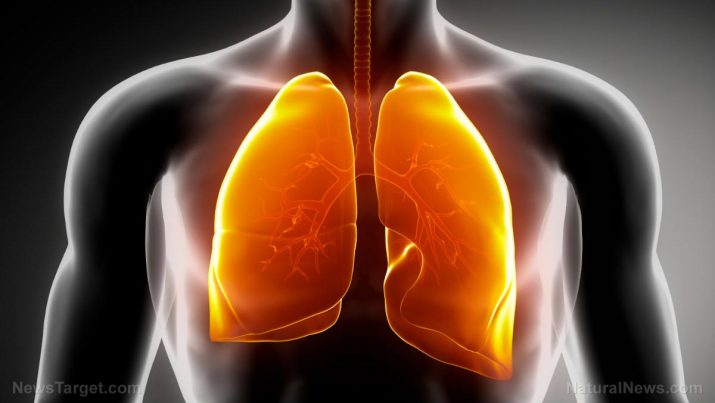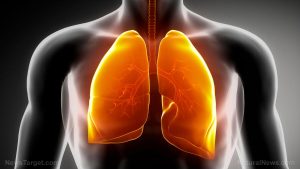
Cystic fibrosis – causes, side effects and treatments at NaturalPedia.com
Tuesday, February 27, 2018 by Zoey Sky
http://www.naturalpedia.com/cystic-fibrosis-causes-side-effects-and-treatments-at-naturalpedia-com.html

Cystic fibrosis refers to a genetic disorder characterized by the accumulation of thick and sticky mucus that can damage the organs. A patient with the disorder may suffer from progressive damage to the respiratory system.
Other common symptoms of cystic fibrosis include chronic digestive system problems. The symptoms this disorder and their severity may vary for each patient.
In a healthy individual, mucus, a slippery substance, lubricates and protects the linings of the “airways, digestive system, reproductive system, and other organs, and tissues.” But for patients with cystic fibrosis, the mucus their body produces is abnormally thick and sticky.
This abnormal mucus can clog the airways, which can cause severe problems with breathing and bacterial infections in the lungs. These infections may lead to chronic coughing, wheezing, and inflammation. Mucus buildup and infections will gradually cause permanent lung damage, such as fibrosis (or the formation of scar tissue) and cysts in the lungs.

Known side effects of cystic fibrosis
The symptoms of cystic fibrosis may depend on the patient and the severity of the condition. Not all individuals may experience symptoms of the disease at the same age. For example, some patients may experience the symptoms of cystic fibrosis as infants, but other children may encounter them following puberty or even as adults.
The symptoms of the disease may either improve or worsen as time passes. Salty-tasting skin is one of the first signs of cystic fibrosis. Parents of children with the disease notice this “saltiness” when kissing their children.
Because of the thick, sticky mucus associated with cystic fibrosis that often blocks the passageways that carry air into and out of the lungs, patients may experience respiratory problems. This may cause the following symptoms:
- A persistent cough which produces thick mucus/phlegm
- Recurrent lung infections
- Shortness of breath (e.g. when exercising)
- A stuffy nose/sinuses
- Wheezing
The abnormal mucus can also block the channels that carry the enzymes produced by the pancreas to the small intestine. The lack of these digestive enzymes means that the intestine is unable to absorb the necessary nutrients from food. This may cause digestive problems such as:
- Appetite loss
- Constipation — Newborn babies may experience meconium ileus, or a bowel obstruction that may require surgery
- Diarrhea
- Difficulty gaining weight — often affects children
- Delayed growth in children
- Greasy and smelly stools
- Jaundice
- Nausea
- A swollen abdomen
Body systems harmed by cystic fibrosis
Other symptoms of cystic fibrosis may cause complications that affect the liver, lungs, pancreas, and other glandular organs.
Patients with cystic fibrosis used to have a lower life expectancy, and it was considered “a fatal disease of childhood.” However, thanks to “improved treatments and better ways to manage the disease,” many patients with cystic fibrosis now have improved longevity.
Older patients with cystic fibrosis often have health problems that concern the respiratory, digestive, and reproductive systems. Almost all men with cystic fibrosis have congenital bilateral absence of the vas deferens (CBAVD). The vas deferens (the tubes that carry sperm) of men with CBAVD are blocked by mucus and are unable to develop properly. Men with this condition are infertile, and they can only father children if they go through fertility treatment. Meanwhile, women with cystic fibrosis may go through complications while pregnant.
Food items or nutrients that may prevent cystic fibrosis
If the body does not get enough protein, fat, and other nutrients, it’s more difficult to fight off colds and other infections. The body will also have a harder time keeping the lungs clear and healthy, and some patients may become underweight.
Individuals with cystic fibrosis will need to eat a balanced diet full of “fat, protein, dairy, fruits, and vegetables” so the body can absorb enough of these nutrients.
Foods or nutrients that can help prevent cystic fibrosis include:
- Antioxidants — Fruits and vegetables are full of antioxidants which can help fight off bacterial infection. Airway inflammation in the lungs, which can make bacterial infection more likely, is a concern for patients with cystic fibrosis.
- Calcium — Calcium can help reduce the risk for osteoporosis of patients with cystic fibrosis. Sources include dairy products like high-fat cheese, high-fat yogurt, and whole milk.
- Fiber — Eating high-fiber foods can help reduce the risk of intestinal blockages. Sources include high-fiber breakfast cereals, which are also high in protein.
- Iron — Iron will help prevent infections. Sources include beef, eggs, liver, lamb tuna, turkey, and seafood.
- Protein — Protein can help prevent muscle loss. Sources include beef, chicken, eggs, fish, and soy.
- Salt — Patients with cystic fibrosis have saltier sweat and this can cause electrolyte imbalance and dehydration. Sources include pickles and salty snacks. Cook vegetables in chicken broth instead of water to help replenish electrolytes.
- Zinc — Zinc can help the body fight off infections. Sources include beef, eggs, kidney beans, liver, seafood, and spinach.
Treatments, management plans for cystic fibrosis
There is no cure for cystic fibrosis, but there are different treatments that can help relieve symptoms and reduce the risk of complications. These include medications, surgery, and home care.
Medication for cystic fibrosis includes:
- Mucus-thinning medications — As the name implies, these make the mucus thinner and less sticky. These can significantly improve lung function and help patients cough up the mucus so it leaves the lungs.
- Bronchodilators — May help the muscles around the tubes that carry air to the lungs relax, which may increase airflow.
- Feeding tubes — Cystic fibrosis may interfere with digestion and prevent the absorption of nutrients from food and a feeding tube can be used to “supply nutrition through the nose or surgically inserted directly into the stomach.”
Surgical procedures include:
- Bowel surgery — This is emergency surgery that will remove a section of the bowel. It may be performed to relieve a blockage in the bowels.
- Lung transplant — May involve the removal of a damaged lung. This surgery will replace the lung with a healthy one, and it often comes from a deceased donor. A lung transplant may be required when a patient with cystic fibrosis has serious breathing problems. Sometimes both lungs may need to be replaced and this might cause severe complications after surgery, such as pneumonia.
Home care for cystic fibrosis includes:
- Drinking plenty of fluids –This can help thin the mucus in the lungs.
- Exercising regularly — This can also help loosen mucus in the airways. Walking, biking, and swimming are great options.
- Avoiding smoke, pollen, and mold — These irritants can worsen the symptoms of cystic fibrosis.
Where to learn more
- Amikacin – side effects, nutrient depletions, herbal interactions and health notes:
- An antioxidant in broccoli and cauliflower may treat cystic fibrosis and other diseases
- Cystic Fibrosis treatment found to be ineffective in younger children
- Is Salt Cave Therapy Worth its Salt?
- Researchers identify natural weapons in the fight against antibiotic resistance
Summary
Cystic fibrosis is a genetic disorder which is characterized by the buildup of thick, sticky mucus that can damage many of the body’s organs. A patient with the disorder may suffer from progressive damage to the respiratory system.
The symptoms of the disease may either improve or worsen as time passes. Salty-tasting skin is one of the first signs of cystic fibrosis.
Other symptoms of cystic fibrosis may cause complications that affect the liver, lungs, pancreas, and other glandular organs.
Individuals with cystic fibrosis will need to eat a balanced diet full of “fat, protein, dairy, fruits, and vegetables” so the body can absorb enough of these nutrients.
There is no cure for cystic fibrosis, but there are different treatments that can help relieve symptoms and reduce the risk of complications. These include medications, surgery, and home care.
Sources include
Tagged Under: Tags: cystic fibrosis





